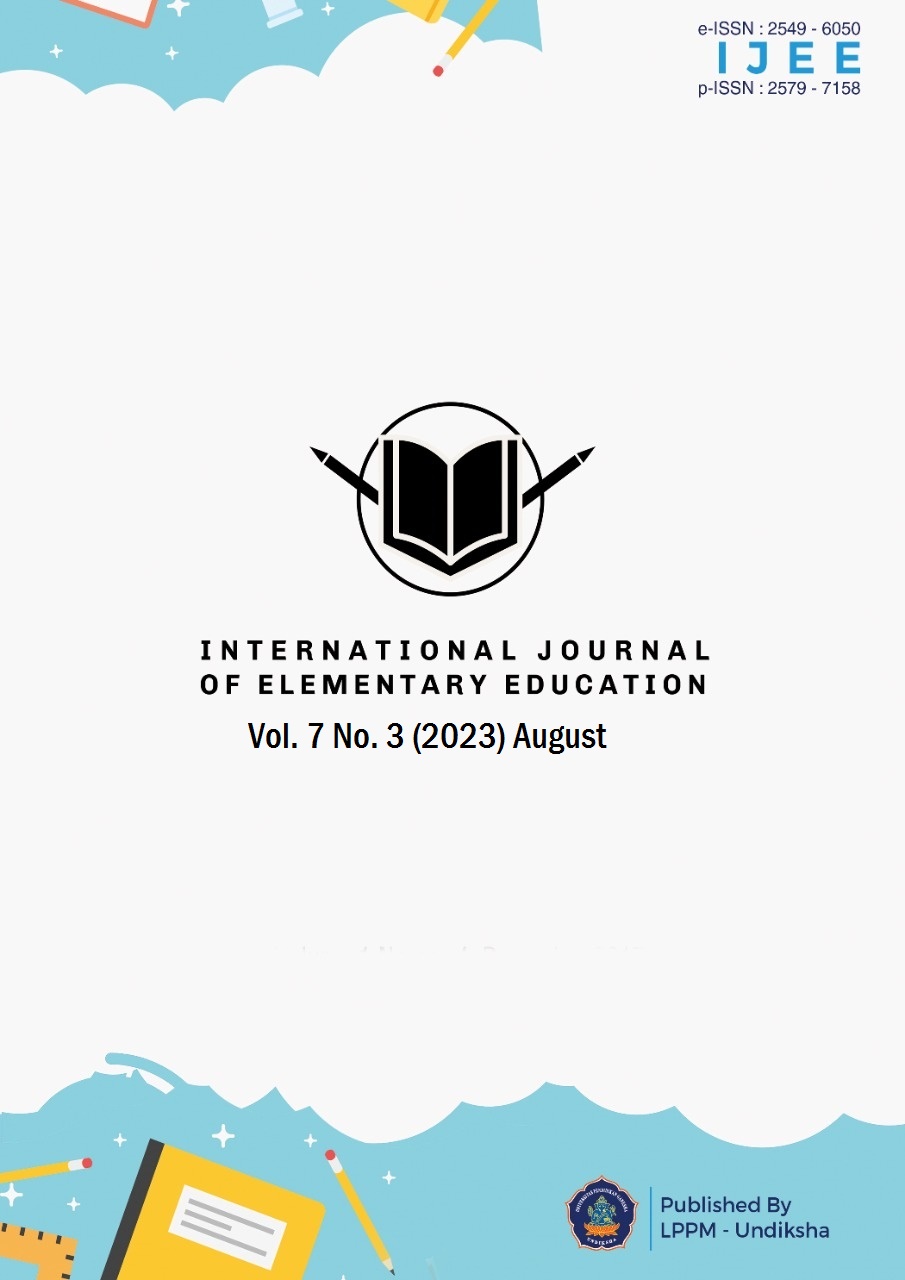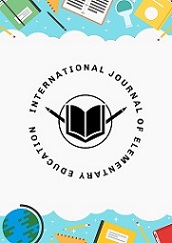FlipHTML5 Assisted E-Book to Improving Elementary School Students' Motivation
DOI:
https://doi.org/10.23887/ijee.v7i3.61566Keywords:
E-book, FlipHTML5, Elementary SchoolAbstract
The utilization of learning media has the potential to captivate and motivate students, as it can enhance the clarity of message and information delivery, thereby facilitating and optimizing the learning experience and outcomes. This research aims to create a FlipHTML5 assisted E-book that can be a proficient educational tool to enhance motivation and academic achievements. The present study employs research and development (R&D) methodology utilizing the ADDIE development model, comprising five stages, Analysis, Design, Development, Implementation, and Evaluation. The product undergoes validation by experts in the relevant fields of material, media, and language, followed by an assessment of media efficacy through a pretest-posttest methodology. The validation outcomes indicate that material experts weighed an average score of 78%, placing it in worthy category. Media experts, on the other hand, weighed an average score of 89%, positioning it in very worthy category. Lastly, language experts weighed an average score of 76%, placing it in worthy category. The present study examines the efficacy of utilizing the FlipHTML5 platform to facilitate the human respiratory system learning material. The study employed N-Gain analysis and a T-Test to discern disparities between the experimental and control groups. The findings indicated that the E-book's development enhanced students' motivation and learning outcomes. Consequently, this research has contributed valuably to establishing a conducive learning environment well-suited for educational purposes.
References
Adinda, S. A., Sirait, D., & Kunci, K. (2022). The Effect Of Team Quiz Method On Students’ Reading Comprehension Skill In Narrative Text At SMP Swasta Al-Hikmah. ALACRITY : Journal Of Education, 2(2), 56–57. https://doi.org/10.52121/alacrity.v2i2.81. DOI: https://doi.org/10.52121/alacrity.v2i2.81
Afnita, Amir, A., Zuve, F. O., Jasid, A., & Annisa, D. (2021). Digital Book as Alternative Solution in Learning During the Pandemic in Indonesia. Proceedings of the 4th International Conference on Language, Literature, and Education (ICLLE-4 2021), 604, 7–10. https://doi.org/10.2991/assehr.k.211201.002. DOI: https://doi.org/10.2991/assehr.k.211201.002
Anwar, Z., & Wibawa, B. (2019). Development of learning resources based on e-books in Sasak Alus language for elementary schools in Lombok. International Journal of Innovation, Creativity and Change, 6(8), 36–45. https://ww.ijicc.net/images/Vol6Iss8/6804_Anwar_2019_E_R.pdf.
Belo, N., McKenney, S., Voogt, J., & Bradley, B. (2016). Teacher knowledge for using technology to foster early literacy: A literature review. Computers in Human Behavior, 60, 372–383. https://doi.org/10.1016/j.chb.2016.02.053. DOI: https://doi.org/10.1016/j.chb.2016.02.053
Doyan, A., Susilawati, S., & Hardiyansyah, H. (2020). Development of Natural Science Learning Tools with Guided Inquiry Model Assisted by Real Media to Improve Students’ Scientific Creativity and Science Process Skills. Jurnal Penelitian Pendidikan IPA, 7(1), 15. https://doi.org/10.29303/jppipa.v7i1.485. DOI: https://doi.org/10.29303/jppipa.v7i1.485
Fitria, Y., Kenedi, A. K., & Syukur, S. K. (2021). The Effect ff Scientific Approach on Elementary School Students’ Learning Outcomes in Science Learning. Jpsd, 7(1), 78–90. https://doi.org/10.30870/jpsd.v7i1.10353.
Haling, A., Sudirman, S., Nasruddin, N., Syamsuddin, S., & Halik, A. (2022). Development of Character-Based Science Teaching Materials Using the Webbed Model to Improve Students’ Creative Thinking Skills. Journal of Educational Science and Technology (EST), 8(3), 172. https://doi.org/10.26858/est.v8i3.39360. DOI: https://doi.org/10.26858/est.v8i3.39360
Imansari, A., Umamah, N., & Na’im, M. (2019). The usage of e-book as learning media through the sigil application in history. IOP Conference Series: Earth and Environmental Science, 243(1), 012155. https://doi.org/10.1088/1755-1315/243/1/012155. DOI: https://doi.org/10.1088/1755-1315/243/1/012155
Kafah, A. K. N., Nulhakim, L., & Pamungkas, A. S. (2020). Development of video learning media based on powtoon application on the concept of the properties of light for elementary school students. Gravity : Jurnal Ilmiah Penelitian Dan Pembelajaran Fisika, 6(1), 34–40. https://doi.org/10.30870/gravity.v6i1.6825. DOI: https://doi.org/10.30870/gravity.v6i1.6825
Lampropoulos, G., Siakas, K., & Anastasiadis, T. (2019). Internet of Things in the Context of Industry 4.0: An Overview. International Journal of Entrepreneurial Knowledge, 7(1), 4–19. https://doi.org/10.2478/ijek-2019-0001. DOI: https://doi.org/10.2478/ijek-2019-0001
Lieung, K. W., Rahayu, D. P., & Yampap, U. (2021). Development of an interactive e-book to improve student’s problem solving. Ilmiah Sekolah Dasar, 5(1), 8–15. https://doi.org/10.23887/jisd.v5i1.29814.
Mardin, S., Ramadhan, A., & Ismail, M. (2022). The Development of an Ebook Integrated with Learning Management System to Improve Student’s Metacognition Ability. Journal of Educational Science and Technology (EST), 8(1), 36. https://doi.org/10.26858/est.v8i1.30947. DOI: https://doi.org/10.26858/est.v8i1.30947
Maulidiyyah, A., Nafiah, N., Hartatik, S., & Rahayu, D. W. (2021). Development Of Dakon Game Interactive E-Book Media To Improve Mathematics Learning Outcome Of Elementary School Students. Education and Human Development Journal, 6(2), 88–101. https://doi.org/10.33086/ehdj.v6i2.2481. DOI: https://doi.org/10.33086/ehdj.v6i2.2481
Nufus, H., Susilawati, S., & Linda, R. (2020). Implementation of E-Module Stoiciometry Based on Kvisoft Flipbook Maker for Increasing Understanding Study Learning Concepts of Class X Senior High School. Journal of Educational Sciences, 4(2), 261. https://doi.org/10.31258/jes.4.2.p.261-272. DOI: https://doi.org/10.31258/jes.4.2.p.261-272
Nurchotimah, A. S. I., Utomo, A. D. N., Khasanah, D. R. A. U., & Nurgiansah, T. H. (2022). Development of Electronic Books (E-Books) for Supervision of Public Services to Increase Knowledge of PPKn Teachers. JED (Jurnal Etika Demokrasi), 7(3), 513–519. https://doi.org/10.26618/jed.v7i3.7656. DOI: https://doi.org/10.26618/jed.v7i3.7656
Nurhayati, N., Linda, R., & Anwar, L. (2022). E-module Using FlipHTML5 Application on Chemical Bond Material. Jurnal Pendidikan Kimia Indonesia, 6(2), 133–141. https://doi.org/10.23887/jpki.v6i2.49542. DOI: https://doi.org/10.23887/jpki.v6i2.49542
Nurpratiwiningsih, L., Didik, &, Setiyoko, T., Diponegoro, P., & 11, R. W. (2018). Development of Education Games Map Material as a Learning Media for Elementary School Students. Journal of Primary Education, 8(3), 249–257. https://doi.org/10.15294 /jpe.v8i3.26251.
Perdana, M. A., Wibowo, D. E., & Budiarto, M. K. (2021). Digitalization of learning media through digital book development using the flipbook application. Jurnal Pendidikan Dan Pengajaran, 54, 263–272. https://doi.org/10.23887/jpp.v54i2. DOI: https://doi.org/10.23887/jpp.v54i2.34639
Puspitarini, Y. D., & Hanif, M. (2019). Using Learning Media to Increase Learning Motivation in Elementary School. Anatolian Journal of Education, 4(2), 53–60. https://eric.ed.gov/?id=EJ1244451. DOI: https://doi.org/10.29333/aje.2019.426a
Putri, A. I. (2022). E-Module Development Of Writing The Syair Perang Menteng Verse-Based Drama Script Using Flip HTML 5. Gramatika STKIP PGRI Sumatera Barat, 8(2), 213–229. https://doi.org/10.22202/jg.2022.v8i2.6204. DOI: https://doi.org/10.22202/jg.2022.v8i2.6204
Putri, S. R., Usman, H., & Sakmal, J. (2022). Development Learning Media E-Book Based on TPACK on Natural Science Education in Elementary School. Indonesia Journal of Learning Education and Counseling, 5(1), 30–34. https://doi.org/10.31960/ijolec.V5i1.1688.
Rahim, F. R., Suherman, D. S., & Muttaqiin, A. (2020). Exploring the effectiveness of e-book for students on learning material: A literature review. Journal of Physics: Conference Series, 1481(1). https://doi.org/10.1088/1742-6596/1481/1/012105. DOI: https://doi.org/10.1088/1742-6596/1481/1/012105
Rahmaniyah, A., Hanifah, N., Sunaengsih, C., & Indonesia, U. P. (2023). Development Of The E-Book " Knowing History Around Us " To Increase Interest In Learning History. Jurnal Cakrawala Pendas (JCP), 9(1), 40–51. https://doi.org/10.31949/jcp.v9i1.3653.
Ramadhani, V. Y., & Khusniati, M. (2022). Development of Interactive E-Books containing Virtual Laboratory to Improve Students’ Motivation Learning. Journal of Environmental and Science Education, 2(1), 49–57. https://doi.org/10.15294/jese.v2i1.53125. DOI: https://doi.org/10.15294/jese.v2i1.53125
Ridho, S., Wardani, S., & Saptono, S. (2021). Development of Local Wisdom Digital Books to Improve Critical Thinking Skills through Problem Based Learning. Journal of Innovative Science Education, 9(3), 1–7. https://doi.org/10.15294/jise.v9i1.37041. DOI: https://doi.org/10.15294/jise.v9i1.37041
Ry-Kottoh, L. A., Esseh, S. S., & Agbo, A. H. (2022). Audiobooks: Improving Access to and Use of Learning and Teaching Materials for the Print-Disabled. The Journal of Electronic Publishing, 24(2), 8–20. https://doi.org/https://doi.org/10.3998/jep.983. DOI: https://doi.org/10.3998/jep.983
Silaban, R., Sitorus, M., Musa Panggabean, F. T., & Manullang, E. (2022). The Development of Electronic Module Based on Scientific Literacy on Colloidal Topic. International Journal of Computer Applications Technology and Research, 11(06), 223–230. https://doi.org/10.7753/ijcatr1106.1007. DOI: https://doi.org/10.7753/IJCATR1106.1007
Sukmawati, W., Sari, P. M., & Yatri, I. (2022). Online Application of Science Practicum Video Based on Local Wisdom to Improve Student’s Science Literacy. Jurnal Penelitian Pendidikan IPA, 8(4), 2238–2244. https://doi.org/10.29303/jppipa.v8i4.1940. DOI: https://doi.org/10.29303/jppipa.v8i4.1940
Sun, A., & Chen, X. (2016). Online education and its effective practice: A research review. Journal of Information Technology Education: Research, 15(2016), 157–190. https://doi.org/10.28945/3502 DOI: https://doi.org/10.28945/3502
Tania, L., & Fadiawati, N. (2015). The development of interactivee-book based chemistry representations referred to the curriculum of 2013. Jurnal Pendidikan IPA Indonesia, 4(2), 164–169. https://doi.org/10.15294/jpii.v4i2.4186.
Tanjung, F. Z. (2020). Teachers’ Views On The Integration Of Technology In Efl Classroom. IJIET (International Journal of Indonesian Education and Teaching), 4(2), 208–215. https://doi.org/10.24071/ijiet.v4i2.2344. DOI: https://doi.org/10.24071/ijiet.v4i2.2344
Widyastuti, E. (2019). Using the ADDIE model to develop learning material for actuarial mathematics. In Journal of Physics: Conference Series, 1188(1), 012052. https://doi.org/10.1088/1742-6596/1188/1/012052. DOI: https://doi.org/10.1088/1742-6596/1188/1/012052
Zulfadewina, Z., Sucipto, A., Iba, K., & Zulherman, Z. (2020). Development of Adobe Flash CS6 Multimedia-Based Learning Media on Science Subjects Animal Breeding Materials. Jurnal Basicedu, 4(4), 1308–1314. https://doi.org/10.31004/basicedu.v4i4.551. DOI: https://doi.org/10.31004/basicedu.v4i4.551
Zulherman, Amirullah, G., Purnomo, A., Aji, G. B., & Supriansyah. (2021). Development of Android-Based Millealab Virtual Reality Media in Natural Science Learning. Jurnal Pendidikan Sains Indonesia (Indonesian Journal of Science Education), 9(1), 1–10. https://doi.org/10.24815/jpsi.v9i1.18218. DOI: https://doi.org/10.24815/jpsi.v9i1.18218
Downloads
Published
How to Cite
Issue
Section
License
Copyright (c) 2023 Afifah Handiar, Mr Zulherman

This work is licensed under a Creative Commons Attribution-ShareAlike 4.0 International License.
Authors who publish with the International Journal of Elementary Education agree to the following terms:
- Authors retain copyright and grant the journal the right of first publication with the work simultaneously licensed under a Creative Commons Attribution License (CC BY-SA 4.0) that allows others to share the work with an acknowledgment of the work's authorship and initial publication in this journal.
- Authors are able to enter into separate, additional contractual arrangements for the non-exclusive distribution of the journal's published version of the work (e.g., post it to an institutional repository or publish it in a book), with an acknowledgment of its initial publication in this journal.
- Authors are permitted and encouraged to post their work online (e.g., in institutional repositories or on their website) prior to and during the submission process, as it can lead to productive exchanges, as well as earlier and greater citation of published work. (See The Effect of Open Access)










